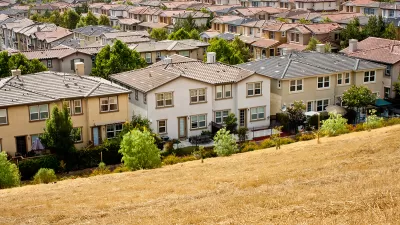Research from the Urban Institute finds that economic hurdles, not just lifestyle preferences, are stopping millennials from buying homes.

Across the U.S., the decline in homeownership among millennials compared to generations past is marked: "For millennials, ages 25 to 34, homeownership is 8 percentage points lower than [it was for] baby boomers at that age and 8.4 points lower than Generation X," Jeff Anderson reports for Curbed. A new report from the Urban Institute asks why this crucial American wealthbuilding strategy appears increasingly unavailable to a generation of young adults, and found that a confluence of debt burden and high housing costs are keeping it out of reach.
In many cases, moving to urban centers for access to good jobs turns out to be a trade-off in terms of a cost of living. In many major cities, rents far outpace incomes and the supply of affordable housing is constrained, making it difficult to save enough to buy a home.
The report also finds that the burden of student debt—which today comes to nearly $1.5 trillion—could account for up to a third of the decline in millennial homeownership. "Buying a home used to be the largest expense a household would make in their lifetime, but over the last 20 years student loan debt has ballooned, loading millennials up with debt before they reach prime home-buying age," Anderson explains.
FULL STORY: Why aren’t millennials buying houses?

Maui's Vacation Rental Debate Turns Ugly
Verbal attacks, misinformation campaigns and fistfights plague a high-stakes debate to convert thousands of vacation rentals into long-term housing.

Planetizen Federal Action Tracker
A weekly monitor of how Trump’s orders and actions are impacting planners and planning in America.

San Francisco Suspends Traffic Calming Amidst Record Deaths
Citing “a challenging fiscal landscape,” the city will cease the program on the heels of 42 traffic deaths, including 24 pedestrians.

Detroit Says Problems With Property Tax Assessments are Fixed. Advocates Disagree.
With higher-valued properties under assessed and lower-valued properties over assessed, advocates say there's still a problem with Detroit's property tax system.

Defunct Pittsburgh Power Plant to Become Residential Tower
A decommissioned steam heat plant will be redeveloped into almost 100 affordable housing units.

Trump Prompts Restructuring of Transportation Research Board in “Unprecedented Overreach”
The TRB has eliminated more than half of its committees including those focused on climate, equity, and cities.
Urban Design for Planners 1: Software Tools
This six-course series explores essential urban design concepts using open source software and equips planners with the tools they need to participate fully in the urban design process.
Planning for Universal Design
Learn the tools for implementing Universal Design in planning regulations.
Heyer Gruel & Associates PA
JM Goldson LLC
Custer County Colorado
City of Camden Redevelopment Agency
City of Astoria
Transportation Research & Education Center (TREC) at Portland State University
Jefferson Parish Government
Camden Redevelopment Agency
City of Claremont





























